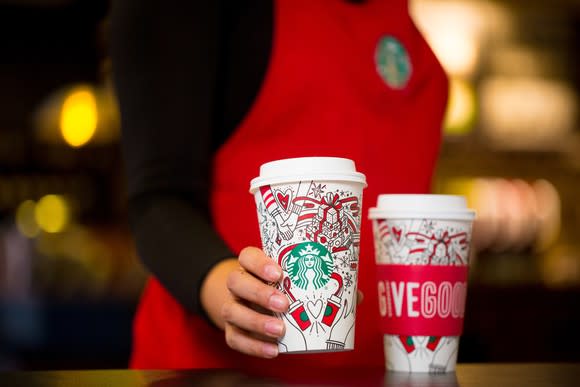Starbucks' PR Crisis May Be Getting Worse
For a long time, Starbucks Corporation (NASDAQ: SBUX) has billed itself as a "third place" for customers -- a place aside from the home and workplace where they can feel welcome. However, that notion came under assault just weeks ago when two black men were arrested for "trespassing" in a Philadelphia Starbucks as they refused to order anything, though they were waiting for a friend in the cafe. The two men were detained for nine hours, and the news sparked outrage and calls for boycotts against the coffee chain.
The event created a public-relations nightmare for a company that prides itself on not just being a third place but also on being progressive by offering employees "bean stock," healthcare, and help with college tuition. A few years ago, Starbucks even inserted itself in the struggle for better race relations with its "Race Together" campaign, which encouraged staff to open conversations with customers about race. Though the initiative was generally considered a failure, it did shine a light on Starbucks' stance on the touchy political subject.
After the incident at the Philadelphia Starbucks, the coffee chain was desperate to recover its image and make sure such an event never happened again. It said it would close all stores on the afternoon of May 29 to conduct a racial-bias training for nearly 175,000 employees across the country and reached an undisclosed settlement with the two men who were arrested.
In a step to make further amends for the wrongful arrest and ensure that it doesn't happen again, Starbucks Chairman Howard Schultz announced that its cafes and bathrooms would be open to anyone, regardless of whether or not they make a purchase.

Image source: Starbucks.
A bridge too far
Starbucks' mission, according to its Twitter page, is "Inspiring and nurturing the human spirit --one person, one cup, and one neighborhood a time." The statement itself is lofty and inspiring, but it also seems divorced from Starbucks' actual business. Most of its customers aren't looking for their spirits to be inspired or nurtured -- they simply want a caffeinated beverage, a pastry, a place to meet a friend or use the Wi-Fi. The business model is simple, but the branding is complicated.
Starbucks may be confusing the two with its latest move, however. While such a policy would have ensured that the arrest at the Philadelphia location wouldn't have happened, it opens the door to myriad problems. In fact, Starbucks' customers have already complained that the new policy could turn its cafes into drug dens or homeless shelters.
After announcing the new policy on Saturday, Starbucks has already been forced to clarify it due to customer concerns that there wouldn't be room for them to sit or that the company's restrooms would become unusable.
Starbucks told The Wall Street Journal that disruptive behaviors like smoking, drug use, sleeping, and inappropriate use of the restroom are not allowed. However, enforcing that policy will be much more difficult than the old one as the coffee chain now seems to be encouraging people to come into its cafes without buying anything. What about someone who comes in with a laptop to use the Wi-Fi and takes up a seat for several hours, for example?
Starbucks seems to be implementing new guidelines since employees called the earlier ones vague, but the new set may only exacerbate problems stemming from the PR crisis and its business, especially at a time when U.S. comparable sales already are seen as lagging.
The coffee chain needs to remember the first rule of business above all others -- take care of your customers. And welcoming in non-paying visitors to compete with already scarce seating and bathrooms is not doing that. While it's understandable that the company doesn't want to endure another backlash like the one sparked by the Philadelphia arrest, closing the stores for a racial-bias education and a simpler fix, like asking employees not to call the police unless someone's safety is at risk or a crime has been committed, should be sufficient.
The recent policy change is a bad move for Starbucks' business and likely will make its stores, which position themselves as more upscale than its peers, less desirable to visit. Don't be surprised if Starbucks eventually reverses itself on the policy change.
More From The Motley Fool
Jeremy Bowman owns shares of Starbucks. The Motley Fool owns shares of and recommends Starbucks. The Motley Fool has a disclosure policy.

 Yahoo Finance
Yahoo Finance 